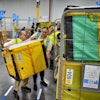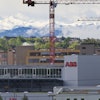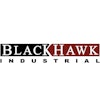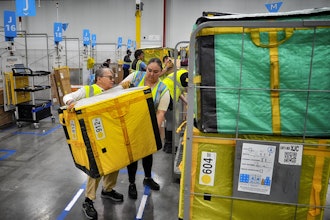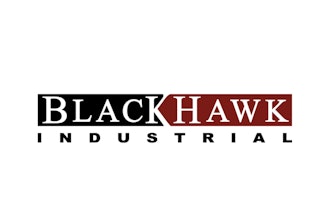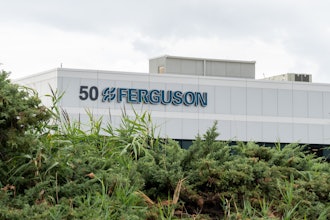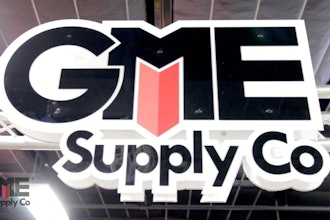SAN FRANCISCO (AP) — In the tech-obsessed South of Market neighborhood that digital sensations like Twitter and Zynga call home, a newfangled workshop for would-be inventors blends a startup sensibility with the area's historic manufacturing roots to give geeks a chance to get out from behind the keyboard.
Modeled after gyms, TechShop is attracting members who pay as little as $100 a month to use industrial strength equipment to invent whatever they can imagine.
"Everybody on the planet has ideas for things they want to make," says TechShop founder Jim Newton, who wants to bring TechShops to cities across the country.
The 17,000-square-foot workshop is nestled in the middle of what was once an industrial hub where ironworks forged equipment for the Gold Rush and later ships during war time.
Housed on two floors of a building that might otherwise have become loft condos, there are workshops for working with wood, metal, plastics and textiles, plus an electronics lab and computer design stations. Amid a sea of workbenches, startups can rent offices by the month.
The biggest machine of all may be a huge contraption that shoots a thin slurry of water mixed with industrial gemstones at 1,800 mph to cut through thick slabs of stainless steel. Upstairs, a 3-D printer molds objects out of plastic straight from a digital file.
Perhaps the most popular tool at TechShop is the laser cutter, a $30,000 metal box delicate enough to engrave paper but powerful enough to cut thick leather. Chief executive Mark Hatch says one of TechShop's most popular events is an evening called "Lasers and Beer." ''The sequence is very important," Hatch jokes. (First the lasers, which they use to etch designs into glass mugs, then beer.)
One laser cutter fan is Marie LaCour, who started her kids' party invitation business, Goobitty Goo, after getting laid off from her graphic design job of 14 years.
"After losing my job, I thought I'd try to go ahead and do this full time," LaCour said. Trying to figure out how to get started without buying the expensive tools herself, she came across TechShop in a Google search, she said while running off a batch of invitations on the laser cutter one recent afternoon. A year later, she says, "this has become my office."
While the staff works to maintain a playful vibe, Hatch is deeply serious in his belief that giving more people access to more tools can transform societies and economies. And he says that the tools available today make that possibility more realistic than ever.
Members must take classes that include extensive safety briefings before they can use specific equipment. Yet the less mechanically inclined don't really need to get their hands dirty: software has near complete control over some of the most complex machines. Hatch claims this makes the path from idea to object a simple straight line.
"We can turn you into what would have historically been a master craftsman in about two class sessions," Hatch boasts.
The ex-Green Beret cites Karl Marx's observation that the Industrial Revolution took manufacturing tools out of the hands of artisans and gave them to industrialists. For Hatch, TechShop is a way to give those tools back to stir what he hopes is an entrepreneurial uprising.
And he says TechShop members already have the inventions to prove it.
After Jack Dorsey co-founded Twitter, his next idea was to offer a device that lets anyone with a bank account and a smartphone accept credit cards. Dorsey's business partner, Jim McKelvey, designed and built a prototype at TechShop in Menlo Park.
Dorsey says his company Square currently processes more than $1 million in transactions per day.
Despite his current aspirations, founder Newton says that his original motive for starting TechShop was purely selfish. He wanted his own shop, but he didn't want to have to make stuff for clients in order to fund it. He just wanted a place to play, and he wondered if the gym membership model might be a way to make that possible.
Newton dropped out of college in the 1980s to get into the emerging computer graphics industry. He worked in software until the first Internet bubble burst at the turn of the century, and he knew he wanted to get back to doing something with his hands.
That passion led him into the world of BattleBots, where contestants build homemade robots with the intention of destroying one another.
From there, he became a science advisor on the popular Discovery Channel show Mythbusters, where ex-special effects wizards perform gonzo science experiments. Newton's tasks included building a "death ray" out of mirrors they hoped would focus enough sunlight on a boat to set the vessel on fire.
Newton opened the first TechShop on a shoestring in Silicon Valley's Menlo Park in 2006. Since then, the shop has grown to nearly 900 members. The San Francisco location opened in December and has nearly 500 members.
Another location has also opened in Raleigh, N.C. In the next year, the goal is to franchise the TechShop model across the country, including a special joint project with Ford Motor Co. in Detroit. The hope is that democratizing the tools of innovation can lead to economic revitalization. Toward that end, the San Francisco location houses the permanent office of a city-backed San Francisco nonprofit, SFMade, that helps inventors turn their ideas into businesses in hopes of creating more manufacturing jobs.
For Newton, the idea of TechShop seems so simple and straightforward he still can't believe someone didn't come up with it before he did.
"It amazes me that nobody's done this yet," he says. "It seems like a dumb, obvious idea that there should be these things all over the place."

